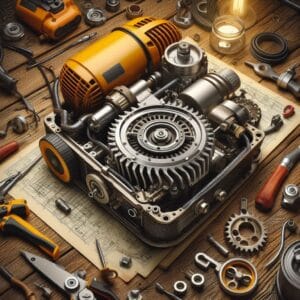Have you ever wondered what size air compressor you need to power your chainsaw? This question might seem trivial, but it can make a world of difference in your chainsaw’s performance and efficiency. Imagine being in the middle of an important project and your chainsaw fails because your air compressor isn’t up to the task. Frustrating, right? In this article, we’ll dive deep into understanding the ideal air compressor size for your chainsaw, ensuring you never face such an issue again. Whether you’re a seasoned pro or a DIY enthusiast, this guide will equip you with the knowledge to make informed decisions.

Understanding the Basics of Air Compressors for Chainsaws
Air compressors are essential tools that provide the power needed for various pneumatic tools, including chainsaws. But how do you determine the right size for your chainsaw? The key factors include PSI (pounds per square inch), CFM (cubic feet per minute), and the air tank size.
PSI: Pounds Per Square Inch
PSI measures the pressure of the air delivered by the compressor. Chainsaws typically require a PSI of around 90 to operate efficiently. However, having a compressor with a higher PSI can be beneficial as it provides more power and can run multiple tools simultaneously.
CFM: Cubic Feet Per Minute
CFM is crucial as it indicates the volume of air delivered by the compressor. For chainsaws, a CFM rating of 4-6 is generally adequate. A higher CFM ensures the chainsaw runs smoothly without interruptions, especially during intensive tasks.
Air Tank Size
The size of the air tank affects how long the compressor can run before needing to refill. A larger tank allows for longer continuous operation. For chainsaws, a tank size of at least 6 gallons is recommended, but larger tanks provide more convenience and efficiency.
Choosing the Right Air Compressor
When selecting an air compressor, consider the following:
- Portability: If you need to move your chainsaw around frequently, opt for a lightweight and portable compressor.
- Power Source: Electric compressors are more common and suitable for most indoor and outdoor tasks. However, gas-powered compressors offer more power and are ideal for remote locations.
- Noise Level: Some compressors can be quite noisy. If you’re working in a noise-sensitive area, look for quieter models.
- Maintenance: Regular maintenance is crucial for longevity. Oil-free compressors require less upkeep but may not be as durable as oil-lubricated ones.
Top Air Compressor Brands for Chainsaws
Several brands stand out in the market for their reliability and performance:
- Makita: Known for their durable and efficient compressors, Makita offers a range of models suitable for chainsaws.
- DeWalt: DeWalt compressors are popular for their robustness and excellent performance in various conditions.
- Porter-Cable: Offering a good balance between price and performance, Porter-Cable compressors are a favorite among DIY enthusiasts.
- California Air Tools: If noise is a concern, this brand is renowned for producing some of the quietest compressors available.
Tips for Maintaining Your Air Compressor
To ensure your air compressor lasts long and performs efficiently, follow these maintenance tips:
- Regular Oil Changes: If your compressor is oil-lubricated, change the oil regularly to keep it running smoothly.
- Drain the Tank: Moisture can accumulate in the tank, leading to rust and other issues. Make it a habit to drain the tank after each use.
- Check and Replace Filters: Filters prevent dust and debris from entering the compressor. Inspect them regularly and replace them when necessary.
- Inspect for Leaks: Air leaks can reduce efficiency. Check hoses and connections for leaks and fix them promptly.
Frequently Asked Questions about Air Compressors and Chainsaws
- What size air compressor do I need for a chainsaw?
- A compressor with at least 90 PSI and 4-6 CFM, and a tank size of 6 gallons or more.
- Can I use an electric air compressor for a chainsaw?
- Yes, electric compressors are suitable for most chainsaws and are convenient for both indoor and outdoor use.
- Why is CFM important for chainsaws?
- CFM determines the volume of air the compressor delivers, ensuring the chainsaw runs efficiently without interruptions.
- Are oil-free compressors good for chainsaws?
- Oil-free compressors require less maintenance and are suitable for chainsaws, though oil-lubricated ones may be more durable.
- How often should I maintain my air compressor?
- Regularly check and replace filters, change oil if needed, and drain the tank after each use to prevent moisture buildup.
- What brands are best for air compressors?
- Makita, DeWalt, Porter-Cable, and California Air Tools are among the top brands known for reliability and performance.
- How can I reduce noise from my air compressor?
- Choose a quieter model or use soundproofing materials to dampen the noise.
- Can a small air compressor handle a chainsaw?
- A small compressor may struggle with continuous operation. A larger tank and higher CFM are recommended for better performance.
- Is portability important for an air compressor?
- If you move frequently, a portable and lightweight compressor is essential for convenience.
- What is the difference between PSI and CFM?
- PSI measures air pressure, while CFM measures the volume of air delivered. Both are crucial for the efficient operation of chainsaws.
By understanding these aspects, you can ensure your chainsaw performs at its best, making your projects smoother and more efficient. Happy sawing!
